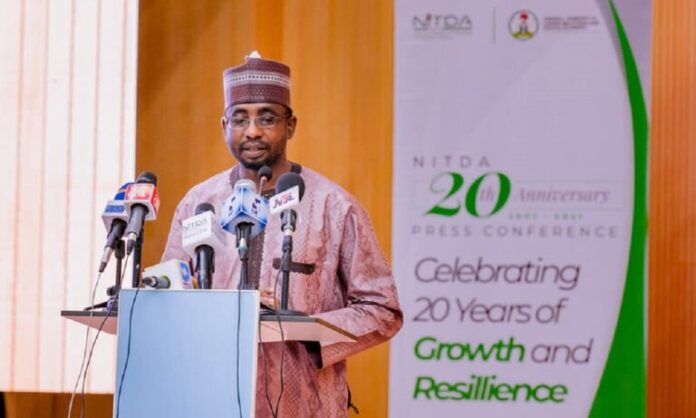NITDA @20: DG Enumerates Remarkable Contributions Of NITDA To Economy
TECH DIGEST – National Information Technology Development Agency (NITDA), the official Government body (in Nigeria) that develops and regulates Information Technology, has reached a significant milestone.
The Agency is celebrating 20 years of ‘growth and Resilience’.
Speaking at a historic event to mark the 20th anniversary of establishing, the Director General, Information Technology Development Agency (NITDA), Inuwa Kashifu Abdullahi, said that this is a huge milestone for every Nigerian because NITDA’s creation symbolised the resolution to embrace digital transformation.
Truly, the story of NITDA explains Nigeria’s journey to a digital economy. Also, the journey may be slow but quintessential evolution into a Digital Nigeria despite the many daunting challenges the country witnesses.
NITDA was established in April 2001, to be precise, on the 18th of April 2001, following the Federal Executive Council’s approval of the National Information Technology Policy in March 2001.
Consequently, the National Assembly passed into law the NITDA Act, 2007, which mandates the Agency to regulate, develop, and advise on Information Technology practices in Nigeria.
“Ever since, NITDA has been working assiduously to help Nigeria catch the train of the 4th industrial revolution without leaving any sector of the economy behind. The Agency has played critical roles in national development by providing the legal framework for information technology development, pioneering IT developmental projects, facilitating access to information technology goods and services, catalysing job creation and ensuring national security”, the DG said.
Abdullahi added that NITDA has substantially actualised the National IT Policy’s goal to digitise Nigeria and the Agency is now in the phase of digitalising the country.
Expatiating on this, the DG described Digitisation as “using IT to enhance traditional processes. In comparison, digitalisation means using IT to deliver new value propositions through innovation. It is about taking advantage of IT as a source of inspiration and strategic national economic, security and social platform”.
It will be recalled that on October 23rd 2019, based on the digitalisation objective, President Muhammadu Buhari, approved the re-designation of the NITDA’s parent Ministry as the Federal Ministry of Communications and Digital Economy with sister agencies including; NCC, NIPOST, NIGCOMSAT, Galaxy Backbone and NIMC.
The primary purpose of the re-designation was to create a policy framework that would oversee the development of the digital economy for a digital Nigeria.
Subsequently, on the 28th of November 2019, the President unveiled the National Digital Economy Policy and Strategy (NDEPS) to facilitate the diversification of our economy and position Nigeria to tap from the $11.5trillion global digital economy worth.
To this end, the DG said that NITDA is playing pivotal roles to actualise the objectives of the NDEPS as it had done with the National IT Policy.
“There is no doubt that there are a lot of achievements recorded by the Agency since its establishment. These achievements include huge ICT contribution to GDP from less than 0.5% in 2001 to more than 14% in 2020, catalysing job creation and igniting innovative activities in the tech ecosystem. Likewise, we have achieved a lot in digital inclusion and literacy. As a result, now we are witnessing the emergence of new economic sectors like Fintech, eCommerce, Venture Capital investment, Business Process Outsourcing, Data Protection Compliance Organisations, IT equipment manufacturing, and robust software industry.
“With this important milestone in carrying out our mandates, we think our 20th-anniversary worth celebrating. Since its establishment, NITDA has evolved in many aspects and responded to its mandates’ dynamics.
“You may be aware that the Agency’s mandates are to achieve three broad objectives mainly. To provide advisory services, regulate and develop the Information Technology Sector. Therefore, the Agency focuses on bridging the digital divide, providing the enabling environment and strengthening the tech ecosystem. In 2007, we started our developmental interventions by deploying ten (10) Rural Information Technology Resource Centre (RITC) across the country’s six Geo-Political zones. The number increased to 17 in 2008, 58 in 2009, and 119 in 2010.
Read Also:
“With increased awareness of the Agency’s intervention, demand-specific interventions were developed. These include Community Access Venues (CACs), Knowledge Access Venues (KAVs), Digital Capacity Building Centres (DCBCs), Digital Job Creation Centres (DJCCs), Digital Divide Bridging Centres (DDBCs), Digital Economy Centres (DECs), IT Infrastructure for Higher Institutions, Wide Area Network for Higher Institutions, Virtual Library, IT Innovation and Incubation Parks, IT Community Training Centres, IT Innovation Hubs, and IT Skills Acquisition and Computer-Based Testing Centres. From inception to date, you will be glad to know that the Agency has deployed over one thousand, five hundred and sixty (1,560) Centres across the country, with a minimum of two Centres in each of the 774 Local Government Areas of the country.
“Another critical area of focus for the Agency was Capacity Building. This started with a Train-the-Trainer programme for Lecturers in Tertiary Institutions. It then grew into having special programmes for Women, People Living with Disabilities, Military and Paramilitary, Public Officers, students, NYSC, Artisans, Primary School Children and now having various programmes delivered online through the NITDA Academy for Research and Training. So far, the Agency has impacted over 2.5 Million Nigerians directly and/or indirectly in multiple areas of IT through its interventions and training.
“It is worth noting that from September 2016 to date, the Agency has witnessed an unprecedented improvement in its activities, especially in the area of regulation. Upon assumption of the office of my Boss and Mentor, Dr Isa Ali Ibrahim Pantami, FNCS, FBCS, FIIM, the then Director-General and now the Honourable Minister of Communications and Digital Economy, he instituted strategic planning and crafted the Agency’s Strategic Roadmap, 2017-2020. The Roadmap was anchored on seven (7) pillars: IT Regulations, Local Content Development and Promotion, Cyber Security, Government Digital Service Promotion, Digital Job Creation, Digital Inclusion, and Capacity Building. The Roadmap shaped and created a direction for the Agency’s activities and immensely contributed to the unprecedented achievements.
“To illustrate this, you may recall that series of Regulatory Instruments were issued in 2019. These include:
The Rule-Making Process Regulation of NITDA;
The Nigerian Data Protection Regulation;
Guideline for the Clearance of Information Technology Projects in Federal Public Institutions;
Guidelines for Public Internet Access;
Framework for the use of Social Media in Public Institutions;
Guidelines for Nigerian Content Development in Information and Communications Technology as amended;
Nigeria e-Government Interoperability Framework (Ne-GIF);
Nigeria ICT Innovation and Entrepreneurship Vision (NIIEV);
Nigeria Cloud Computing Policy; and
Framework and Guidelines for ICT Adoption in Tertiary Intuitions.
“Some of the Regulatory Instruments were operational before their release. For example, the enforcement of the IT Clearance Process of NITDA started in December 2016. In addition to the value addition to IT project delivery, the IT Clearance has saved over 22.45 billion Naira for the Federal Government.
The Agency has also successfully investigated and issued data breach fines to many organisations, including public institution
“Similarly, with the release of the Nigeria Data Protection Regulation (NDPR), NITDA has created a new industry, stimulated new business models, and empowered thousands of Nigerians through capacity building and skills development.
“We licensed 72 Data Protection Compliance Organizations (DPCOs), created over 2,686 new jobs roles in the industry, developed a new data protection sector valued at around 2.2 billion Naira. The Agency has also successfully investigated and issued data breach fines to many organisations, including public institution. More importantly, other countries are looking up to the Agency for guidance on Data Protection Regulation.
“You may also be aware that the National Digital Economy Policy and Strategy for a Digital Nigeria (NDEPS) replaced the National IT Policy. Therefore, with the expiration of NITDA’s Strategic Roadmap 2017 – 2020, we have developed a new Strategic Roadmap in line with NDEPS, which will be unveiled next week.
Other success stories you may be aware of include:
Rebranding the Agency in line with NDEPS vision;
Forging National and International Collaboration and Partnership with critical stakeholders;
Establishment of the National Centre for Artificial Intelligence and Robotics (NCAIR); and
Commencement of the Development of the National Digital Innovation and Entrepreneurship Centre.
The DG also applauded the strategic leadership of NITDA’s founding fathers, the previous Chief Executive Officers of the Agency, and the active support of parent ministry, governing board of the Agency, management, and the entire staff.




















